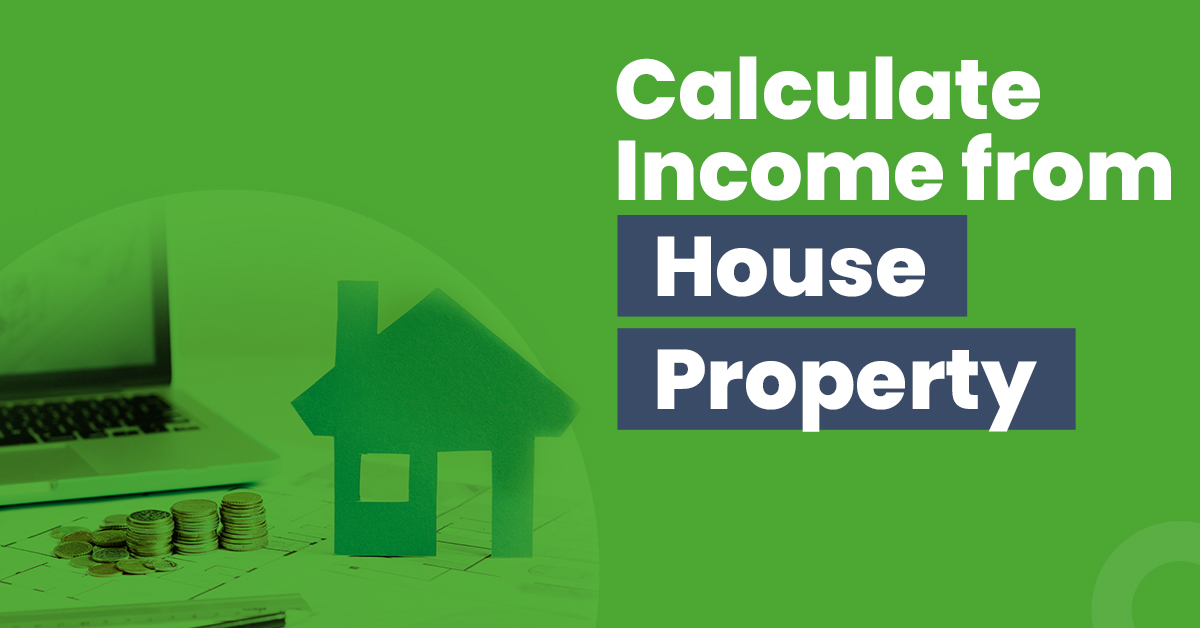How to Calculate Income from House Property?


The income earned by a person can fall under any of the heads of income provided under the Income Tax Act, 1961. Each head of income has its computation mechanism, i.e., an income falling under a particular head of income is reduced by any deduction that is allowed by the Income Tax Act, 1961 to arrive at the net taxable income.
“Income from House Property” is one such head of income. Rental income received from the ownership of a house property is taxable under this head.
In this article, we shall discuss everything you need to know about calculating the amount of rental income taxable under the head “Income from House Property”.
What is a House Property?
For income tax purposes, a “house property” consists of buildings or land appurtenant to the buildings. Buildings include not only residential buildings but also commercial buildings such as factories, shops, offices, theatres and godowns. Land appurtenant means land connected with the building such as gardens, garages, etc. In other words, the land must be necessary for the enjoyment of the building.
What are the Conditions for the Taxability of Rental Income?
The rental income received by an owner of a house property during a financial year is taxable at the time of filing the income tax return for that year.
If any of the following factors are fulfilled, rental income is taxable as business income and not under the head “Income from House Property”:
- The property is used by the owner for any business being carried out by them
- The owner is in the business of letting out house properties
- The property is held as an inventory by the owner
What are the Different Types of House Properties?
House properties are classified into different categories based on the ownership of the property. For calculating the taxable income, it is important to know these categories:
- Self-occupied House Property
A house property that is used by a person for their own residence is known as a self-occupied house property. Up to two residential properties can be claimed by a person as self-occupied within a given fiscal year.
- Deemed to be Let-out House Property
If a person owns more than two house properties for self-occupation, the other properties are treated as deemed to be let-out. As the name suggests, a deemed to be let-out house property is considered to be let-out whether or not it is actually let-out.
- Let-out House Property
A house property that has been let-out in exchange for rental income is known as a let-out house property.
- Partly Let-out and Partly Self-occupied House Property
The part of the property that is let-out is considered under the “let-out house property” category and the other part that is self-occupied is considered under the “self-occupied house property” category.
How to Calculate Income from House Property?
The following steps depict how you can calculate income from house property:
- Step 1: Calculation of Gross Annual Value
The process of calculation of income from house property begins with the determination of the Gross Annual Value (GAV) of the property. GAV is an estimation of the amount of rent for which a house property can be let-out.
A self-occupied house property does not have a GAV. For other types of house properties, the GAV is generally the higher of the actual rent received from the property or the expected rent receivable from the property.
- Step 2: Calculation of Net Annual Value
The Net Annual Value (NAV) is calculated after deducting the municipal taxes actually paid by the owner from the GAV. However, municipal taxes cannot be deducted in the case of a self-occupied house property.
- Step 3: Deductions
Section 24 of the Income Tax Act, 1961, allows the following deductions from the NAV:
- Standard deduction of an amount equal to 30% of the NAV; and
- Interest on loans taken for acquisition, construction, repairs, renewal or reconstruction of a house property
The calculation of income from house property is summarised below:
| Particulars | Amount(₹) |
| Gross Annual Value | XXX |
| Less: Municipal Taxes | XXX |
| Net Annual Value | XXX |
| Less: Deductions under Section 24 – Standard Deduction @ 30% – Interest Paid on Loan | XXXXXX |
| Income from House Property | XXX |
Frequently Asked Questions
Can I report a loss under the head “Income from House Property”?
Yes, if you have a self-occupied property which you have taken on loan, it is likely that you will have a loss under the head “Income from House Property”. This is because GAV for a self-occupied property is Nil. Any interest that you pay on the loan can be deducted thereby resulting in a loss.
What is the maximum allowable limit of interest paid on housing loans?
There is no restriction on interest deduction for let-out property. In the case of self-occupied property, interest on loan taken for acquisition or construction is capped at ₹ 2 lakh and interest on loan taken for repairs or renewal is capped at ₹ 30,000 per year.
I have a house property situated outside India. Do I have to pay taxes in India?
If you are a tax resident of India, income from house property situated outside India is taxable in India, whether such income is brought into India or not. If you are a non-resident, income from a property situated outside India is taxable in India only if it is received in India.




